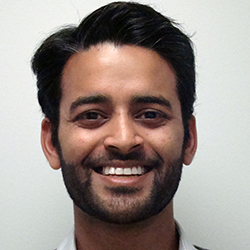What Do Your Data Say?
Free, four-week, online course aimed to help experimentalists handle their own data starts April 13
Northwestern Engineering is offering a free, non-credit bootcamp, “What Do Your Data Say?” to academics, researchers, and students at any institution to develop their data skills while experiments may be slowed.
The four-week stand-alone course, starting April 13, aims to help researchers think quantitatively and statistically about their own data.
Madhav Mani, assistant professor of engineering sciences and applied mathematics, developed the online MOOC-style course in response to the COVID-19 pandemic.
 “This course is targeting experimentalists who can’t really do their work at home right now,” said Mani, who is a leadership council member and project leader in the NSF-Simons Center for Quantitative Biology. “We want to give the students street fighting skills in statistics and coding.”
“This course is targeting experimentalists who can’t really do their work at home right now,” said Mani, who is a leadership council member and project leader in the NSF-Simons Center for Quantitative Biology. “We want to give the students street fighting skills in statistics and coding.”
The course, a condensed version of the undergraduate course ESAM 375-1: Quantitative Biology, centers on applying statistical and mathematical techniques the modern way, with a computer, and covers topics including parameter estimation, hypothesis testing, and dimensionality reduction centered on specific data. Ultimately, students will acquire a set of tools to attack any quantitative problem, make a conclusion, and assess their confidence in that conclusion.
There are no prerequisites for the course, conducted in three, one-hour segments each week. No previous experience in statistics or coding is necessary.
“The students will need to go up a coding learning curve very quickly,” Mani said. “But the best way to learn quickly is to do so in the context of something you care about.”
Recorded video lectures are provided asynchronously, available on the student’s schedule, via Panapto’s learning platform. Four teaching assistants are volunteering their time to monitor working sessions of breakout groups via Zoom as the students practice on worksheets using the Jupiter Environment for Python.
“Assignments will be challenging and open ended, and will be focused on developing the muscles needed to help researchers analyze and synthesize their own data in any field,” Mani said.
Mani worked closely with Caroline Freitag, research project coordinator at Northwestern’s Searle Center for Advancing Learning and Teaching, to develop learning objectives and activities for each class in the course. The course uses OneNote to streamline videos, notes, and other materials. Graduate student Eric Johnson is co-instructor and Tiffany Leighton Ozmina, administrative director with the NSF-Simons Center for Quantitative Biology, provides technical help.
Registration is limited. Sign up for the course.